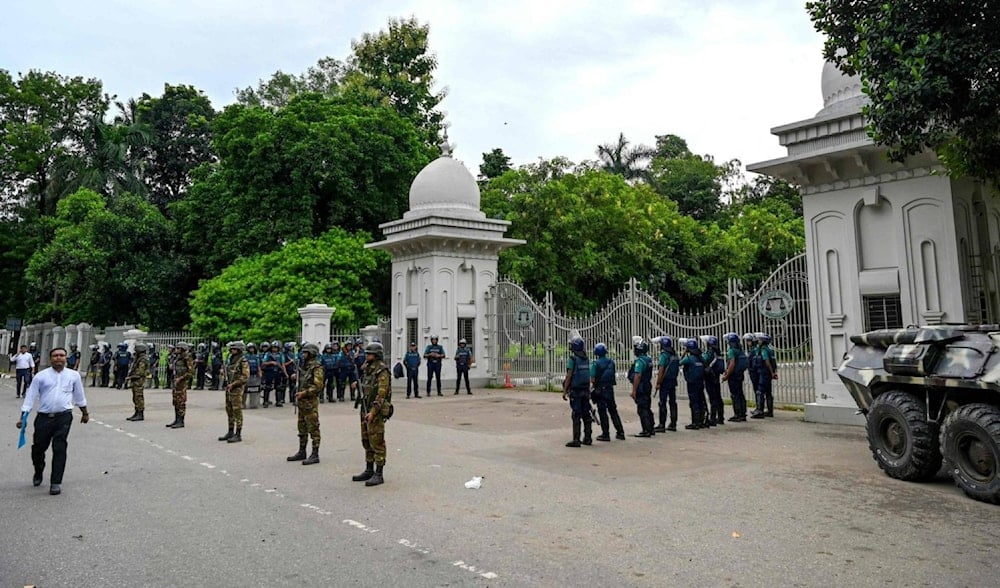Bangladesh PM blames opposition for violence in anti-quota protests
Demonstrators demand a public apology from Sheikha Hasina concerning the violence, also asking for internet connectivity, and the reopening of educational institutes following the Supreme Court quota reduction decision.
-

Bangladeshi soldiers stand guard at the Supreme Court of Bangladesh, amid the anti-quota protests in Dhaka on July 21, 2024. (AFP)
Bangladesh Prime Minister Sheikh Hasina blamed her political opposition for the violence during the student-led anti-quota protests that led to 147 deaths, highlighting on Monday that the imposed curfew would be lifted when the situation improves.
"When arson terrorism started, the protesting students said they were not involved in it," Hasina said in an address to business leaders in Dhaka, adding that the curfew was imposed "to protect the lives and property of the citizens. I never wanted it."
The prime minister blamed her main opposition, the Bangladesh Nationalist Party (BNP) and the Jamaat-e-Islami Party's student wing, for the deadly violence that began last week.
The parties, who have accused Hasina's government of authoritarianism, human rights violations, and freedom of speech and dissent restrictions, did not comment on the prime minister's accusation against them.
48-hour ultimatum
"We are giving an ultimatum to the government to fulfill our eight-point demand within 48 hours," Anti-Discrimination Student Movement leader Hasnat Abdullah told reporters.
Demonstrators demanded late Sunday a public apology from Hasina concerning the violence, the reinstatement of internet connectivity, and the reopening of educational institutions.
The Anti-Discrimination Student Movement also demanded the resignation of some ministers and university officials, as well as the termination of police officials present at the scene where students were killed.
Despite the violent protests that occurred throughout the week, alongside the security forces' use of tear gas, rubber bullets, and sound grenades to disperse the proteste.3rs, the majority of the country conformed to the imposed curfew on Monday.
Tanks and armed security forces continue to be stationed around the country's capital city where there were no reports of violence in the country, officials reported.
Since the beginning of the demonstrations, the police have arrested 516 people for their involvement in "destructive attacks," while police spokesperson Faruq Hossain reported that three policemen were killed amid the protests and more than 1,000 were injured.
Bangladesh's top court reduces job quotas that sparked unrest
The Supreme Court of Bangladesh on Sunday significantly reduced the number of government jobs reserved for war veterans and their descendants.
Shah Monjurul Hoque, a lawyer representing student groups, indicated that the court ruled that only 5% of government jobs will now be reserved for the children and grandchildren of those who fought for Bangladesh's independence from Pakistan in 1971, down from the previous 30% quota for this group.
The court's ruling also reduces quotas for other groups and abolishes quotas for women and those from certain districts. The quota for ethnic minorities is reduced to 1% from 5%, while the existing 1% of jobs reserved for people with disabilities remains unchanged.
Overall, the ruling decreased the number of reserved jobs from 56% to 7%, opening up many more civil service positions to university students who had deemed the previous system unfair and demanded its overhaul.
Why are they protesting?
Since July 1, thousands of Bangladeshis have been protesting the reinstatement of the quota system, which was abolished in 2018 but restored this year.
With around 18 million young people in Bangladesh out of work, according to government data, the reintroduction of the quota scheme has deeply frustrated graduates who are already facing a severe job crisis.
Last week, the government deployed police and paramilitary forces to contain the violence, but the unrest persisted. On Friday, the government imposed a curfew and brought in the army to curb the protests.
The quota system was originally implemented by Sheikh Mujibur Rahman, the founding leader of Bangladesh and father of Prime Minister Sheikh Hasina, as a reward for fighters who fought in Bangladesh's 1971 liberation war against Pakistan. In 1997 and again in 2010, the quotas were expanded to include the descendants of freedom fighters.
Students argued that the system was unfair and called for most government jobs to be awarded based on merit.
In June, the high court reintroduced the quotas after descendants of the war veterans advocated for their reinstatement. When the protests began, the Supreme Court temporarily paused the reinstatement pending a final decision, which was delivered on Sunday.
Sheikh Hasina further inflamed tensions this month by likening the protesters to the Bangladeshis who collaborated with Pakistan during the country's independence war.

 4 Min Read
4 Min Read










